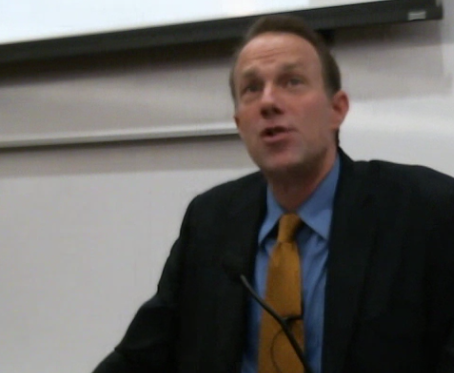Justice Thomas Lee: Law & Linguistics

CodeX had the pleasure of back-to-back CodeX Talks last week, with Harry Surden on Wednesday and Utah Supreme Court Associate Justice Thomas Lee on Thursday. Lee presented “Law and Corpus Linguistics: Statutory Interpretation in the Age of Big Data,” a fascinating discussion of how technology—including Google—is helping judges understand subtle nuances of language that can be crucial in determining a decision.
Judging, he said, involves “interpreting legal language and resolving ambiguity.” The domain of interpretation includes the Constitution, statutes, regulations and contracts, he explained. But words can be very ambiguous, he noted, citing a clever example, “In port, the portly porter ported the port, through the port port.”
Words can have multiple meanings, such as legal terms of art, tech jargon, and ordinary meaning can be excluded by statutory context, said Lee.

A key message was that words can be very nuanced and determining an “ordinary meaning” can be as slippery as Alice in Wonderland’s adventures.
Lee discussed three cases that are “examples of lexical ambiguity in statutory interpretation, resolved by the cited courts by a search for ‘ordinary meaning’ of the terms in question. My thesis is that corpus linguistics is a more reliable means of finding ordinary meaning of statutory terms,” he said.
Muscarello v. United States, 524 U.S. 128 (1998), which involved a person transporting a firearm in a glove compartment of a vehicle driven to a drug crime is one who ‘carries a firearm’ under 18 U.S.C. section 924(c)(q). In this case, the definition of “carry” was crucial, and at questions was whether that word “in its ordinary sense includes carrying in a car.”
United States v. Costello, 666 F.3rd 1040 (2012) U.S.C., involved an illegal alien and whether there was an attempt to conceal, not just prove shelter. Lee noted that “Dictionary definitions are acontextual, whereas the meaning of sentences depends critically on context, including all sorts of background understandings.”Lee explored the concept of “sense ranking” and how that has evolved.
State v. Rasabout, 2015 UT 72, _P.3ed_ “involved the ordinary meaning of ‘discharge’ of a ‘dangerous weapon or firearm’ under Utah Code section 76-10-508 is a single shot.”
Lee cited Henry Sweet: “The meaning of a word in a given period of a given language is a matter of usage, and the fact of its having had a certain meaning at some earlier period or in some cognate language does not necessarily afford any help in determining … its present meaning.”
In Costello, U.S. Court of Appeals Judge Richard Posner (Seventh Circuit in Chicago) turned to the Internet to help him come to a conclusion about the appropriate definition of the word “harbors,” noted Lee. “Dictionary definitions are acontextual, whereas the meaning of sentences depends critically on context, including all sorts of background understanding.”
In State v. Rasabout, a Google News search pulled up 43 newspaper articles published between March and July 2015 using the phrase “discharge a firearm.”
Lee also discussed the Corpus of Contemporary American English search engine.
None of these are perfect, noted Lee—issues can include lack of adversary briefing, and judges aren’t linguists. “Corpus linguistics is the main domain of expert witnesses,” he said. Sample size, intercoder reliability and stuffy population are some of the issues that need to be addressed in order to begin to create a standardized approach.
Figuring out the meaning of a word can make the difference in the outcome, and in criminal matters can make a huge difference in how long an individual can be incarcerated, he noted.
“The resolution of ambiguities in legal language is one of the most important of all judicial tasks,” said Lee. “It is also one of the most opaque; for that reason it is fraught with the potential for bias and errors. We should do what we can to minimize those risks.”
Monica Bay is a Fellow at CodeX and a freelance journalist for Bloomberg BNA Big Law Business. She is a member of the California bar. Twitter: @MonicaBay Email: mbay@codex.stanford.edu.
